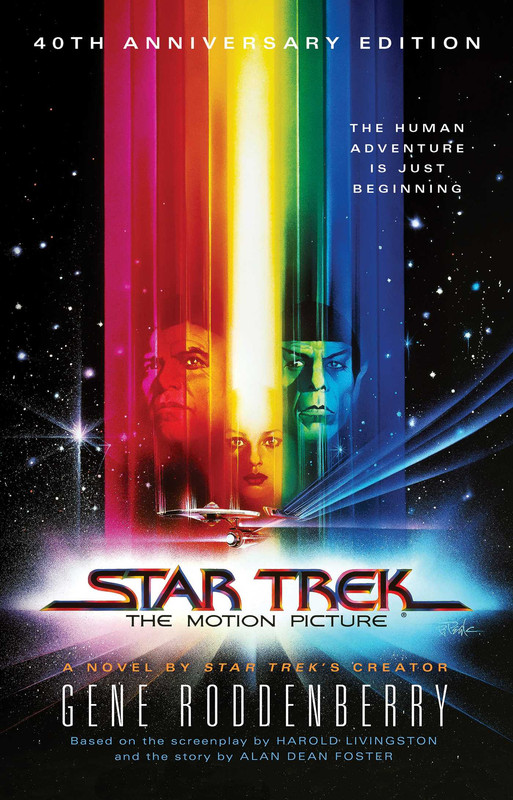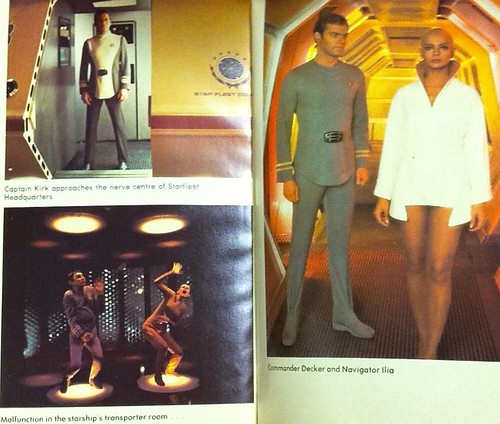Warning: I can write about this book a LOT.
If you're implying that the Borg are responsible for creating V'Ger, the timeline doesn't fit. The Borg are thousands of years old.
Also, the Borg would have ignored the Voyager 6 probe, dismissing it as primitive and unworthy of assimilation. Just like they did with the Kazon.
I never bought the "Borg made Vejur" but it was a Roddenberry idea.
OTOH, one might (must?) assume that Voyager traveled back in time as well as space. That gives it enough time to explore "the universe".
OK. When there is a new printing of a book that has been a constant part of your bookshelf for forty years (and sometimes with more than one copy) and you still think of buying it you just may have a problem. I'm not positive but I don't think I've gone more than five years at a time without re-reading this book.
This book works for me on multiple levels. First it's a great Star Trek book that tells a great story that might even be paced a little better than the movie. The movie is frequently described as slow (your mileage may vary) but the book is breezy!
But the real meat here is that this is the first and only telling of the 23rd Century from The Great Bird himself. He gets to tell you what Earth and life for humanity are like in his grand vision of the future. He gets to figure out why his lofty ideal world is populated with characters out of the Old American West on phaser laden spaceships. Part of it, he says, is that Starfleet (I forget, does he spell it Star Fleet or Starfleet?) is peopled with "throwbacks", rougher more comparatively conservative types as opposed to more "evolved" Roddnberryan New Humans. The other part is that the television show Star Trek is not what actually happened but rather a dramatization of true events. (One wonders who the audience would be? The New Humans are into melodrama? Also, where does the author himself fit on this scale?)
If you don't read ANYTHING else, read Roddenberry's introduction and Kirk's. (Yes, Roddenberry introduces the idea of "love instructors", simultaneously telling us that people in the 23rd century are not as obsessed with sex and that Roddenberry was obsessed with not much else. Also, could the name be any more seventies if it tried?) It's a charming device that tells us that 1) this is all true 2) Roddenberry is a real person in the 23rd century and 3) James Kirk was not happy with Star Trek. Ha!
Yes, Roddenberry created an entire race that was just really good at sex. (But also great navigators?) Outside of the Ferengi (rabid capitalists who keep their women naked and are prodigiously endowed) the Deltans may be the most Roddenberry creation ever.
We hear of an Earth where the Mediterranean Sea has been dammed for power and reduced to a lake (and people complain about Lake Powell!), above ground cities are museum pieces now (take THAT Star Trek: Picard!), and we learn more of Earth's growing pains by finding out about the "mind control revolts" of the 21st century. (We have it good compared to Star Trek!) As noted by someone else, Alcatraz is now a children's park. Benedict-Khan, you monster!
I've heard criticism of the footnotes. I don't get it. I enjoyed the way that they makes the book feel like an historical document (twenty years before Galaxy Quest) or at least a non-fiction book. It also allows the occasional first person account from other characters. I'd actually have liked to have seen it more.
The most explicit reference to The Original Series is from For the World is Hollow and I Have Touched the Sky of all things! McCoy wears Fabrini medallions and has been researching Fabrini medicine. It's also noted that this research was contributed to the redesign of the Enterprise's cutting edge sick bay. Of course Wil Decker's father Matt is also mentioned (although I don't recall if by name).
Scotty's character in this book is interesting to me. He feels like the character given the most spicing up from his on-screen appearance. He's on a first name basis with Kirk and is far less deferential than he was sometimes depicted. Of course I also feel that Doohan played him as far more grown up and less of a cartoon in this film than almost anywhere else.
I love all of the Kirk stuff before he gets to the Enterprise. Touring the Library of Alexandria, how the Klingon attack is shown to him (twice!), his relationships with Lori and Nogura.
One nice detail that is sometimes borne out on ships schematics and sometimes not is that the windows on the Enterprise are actually in front of little pockets of hull where they can't put anything else. Certainly not what we would get in later Treks.
Another interesting detail for me (given later Treks) is how often Kirk considers things in terms of defense. An obvious example is when he sees the new Klingon K'Tinga class ships and notes that experts have worried that they will outclass their Federation counterparts. Kirk notes that while the Enterprise is classed as a Heavy Cruiser that term is polite fiction and the ship would be better classified as a battleship. (I forget, did Franz Joseph come up with Heavy Cruiser or did that come from The Making of Star Trek? I'm leaning towards the latter. This is why I need digital copies of all of these that I can search wherever I am.) Another point is when the Enterprise is engulfed by Vejur's whiplash bolt and the crew is nearly paralyzed by the sheer deafening sound and Kirk thinks to himself "If I don't die I need to tell Nogura what an effective weapon sound can be." Yikes!
Another interesting quirk in the mind of Roddenberry is how he tries to note that the "Officer's Lounge" is open to anyone who wants to go. But they just don't out of respect and deference to the upper ranks. I've always wondered how Ensign Jones would be received if he decided to hang out in the lounge where he was supposedly welcome. I might uncharitably make a comparison to "People of any color can come in here they just choose not to." Maybe.
The movie goes from being Kirk's story in the beginning to really being Spock's by the end. I feel that the book stays on Kirk from start to finish with some good Spock moments (Vulcans have a seventh sense that tells them there is a god!) that are usually dictated by plot more than an exploration of the character. If I'm misremembering or misinterpreting, please chime in.
The book ends with a triumphant James Kirk mulling what he would do next. He notes that Nogura will give him anything he wants at this point and what he wants is the Enterprise. (This is why I believe that while they're not incompatible The Motion Picture are really parallel rather than consecutive stories.)
Whew! I think I've hit everything. It's a great book. It distills the best parts of the movie and adds the kind of "definite take" that only Roddenberry could manage. And I think he does it well.
Has anyone revisited David Gerrold's Encounter at Farpoint lately?





 Cheers.
Cheers.